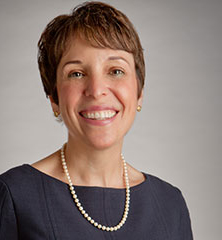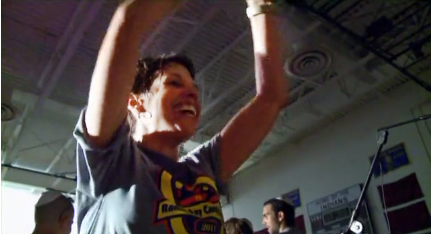Amy Skopp Cooper
On structuring our environments with intentional attention
 It was one summer only after a week of working as a high school student at a Ramah camp that Amy Skopp Cooper, MA’88 knew she wanted to be a Ramah Camp director. “I even said that to the director of the camp, Debby Hirshman,” recalls Amy. “She asked me if I was enjoying camp so far and I said, ‘Yes, I love it. I think I want to be a Ramah director.’ Instead of rolling her eyes at me like I was some presumptuous kid, she said ‘Let’s sit down and talk about that soon.’”
It was one summer only after a week of working as a high school student at a Ramah camp that Amy Skopp Cooper, MA’88 knew she wanted to be a Ramah Camp director. “I even said that to the director of the camp, Debby Hirshman,” recalls Amy. “She asked me if I was enjoying camp so far and I said, ‘Yes, I love it. I think I want to be a Ramah director.’ Instead of rolling her eyes at me like I was some presumptuous kid, she said ‘Let’s sit down and talk about that soon.’”
“That was just like something Bernie [Reisman] would have said. The message that was so clearly modeled, was ‘Take young adults seriously.’ Don’t poo-poo them or laugh at them. And be sure to have those promised conversations and follow up. That was so much like Bernie.”
Amy has been Director at the Ramah Day Camp in Nyack now for 19 years. She’s also Associate Director for the National Ramah Commission.
 Amy Skopp Cooper at camp
Amy Skopp Cooper at camp
Amy’s passion is not just for camp. She’s an impassioned Jewish educator who develops and supports an array of innovative, experiential programs at camp and in the classroom. In 2011, the Covenant Foundation honored Amy with a Covenant Award for Exceptional Jewish Educators.
“I was inspired to become a Jewish educator because I was fortunate to be a student of so many extraordinary Jewish educators and role models,”says Amy.
“My mentors taught me how to apply educational theory and vision to my work, the importance of an institution’s ethnography and how to structure intentional environments. That was a phrase Bernie used a lot and it gives me great pleasure to hear my staff and those I have mentored use it even now.”
In Her Own Words: An Interview with Amy Skopp Cooper
Expand All
I was lucky yes. He knew us well. My first memory of Bernie is a story that demonstrates his approach and which shaped me professionally in a lot of ways. It was 1986 and in those days we still depended on printed brochures. When I called the number on the Hornstein brochure to learn more about the program, Bernie himself answered the phone. It’s not often the director of a program takes calls like Bernie did. He thought it was good professional practice to directly connect with people; he was very hands-on.
That first talk with Bernie had such an impact on me and it’s something I’ve carried into my own professional life and tried to model. That attitude makes you completely approachable. That’s what Bernie taught. I am a hands-on leader. I’m don’t just sit in my office with the doors closed because I have too many more important things to do then to take the time to speak to you.
That’s what Bernie taught: he was a hands-on leader who didn’t sit in his office behind a closed door. In fact, most of the time he wasn’t in his office, he was with us. He was always accessible and knew us very well.
The other Bernie story is about how he taught us to “structure our environments.” It’s a phrase he used and I took it with me into my work. Hearing people I’ve hired or mentored over the years use that same phrase is gratifying. I think “There’s Bernie, continuing to inspire and guide.”
And it’s not just having the phrase. It’s understanding that things can look like they’re spontaneous but they’ve actually taken very meticulous planning.
Bernie taught us that everything is critical to the success of a project, and to always be there physically, to look at any environment, whether it’s a landscape, or communal space, or whatever environment it is, to make sure that it’s exactly what you want it to be, humming with everyone’s good energy, and as close to perfect as human beings can achieve.
My formative teen years were spent doing Jewish things: I graduated from theSolomon Schechter High School of Essex and Union (now the Golda Och Academy), was on the International Board of United Synagogue Youth, attended Camp Tel Yehuda (beginning when I was 14), spent a lot of time in Israel, and was at virtually every Soviet Jewry rally I could find. I had incredible role models and gifted teachers who guided me along the way.
These experiences helped shape my desire to be a Jewish educator before starting college. I did my undergraduate degree in Jewish History and Philosophy at The Hebrew University of Jerusalem. During my college years, I spent every summer working at Camp Ramah. I took a year off before starting Hornstein to work full-time for Camp Ramah in New England.
I took this position at B'nai Israel because I had the chance to recreate an educational program thanks to a parent-base who cared about education. We created new programs where there would be serious text and Hebrew learning, and a willingness to experiment and create new models, build chavurot, and engage families in multi-generational programming.
I had already spent eight summers at Ramah. It was (and is) one of the most inspiring, innovative, intentional Jewish educational playgrounds I know of.
From the beginning, I sensed that I wanted to be a Ramah director. I even said that to the director of the camp, Debby Hirshman, when I was 16 after a week and half back at camp. She asked me if I was enjoying camp so far and I said, “Yes, I love it. I think I want to be a Ramah director.” Instead of rolling her eyes at me like I was some presumptuous kid, she said “Let’s sit down and talk about that soon.” That was just like something Bernie would have said. The message that was so clearly modeled, was “Take young adults seriously.” Don’t poo-poo them or laugh at them. And be sure to have those promised conversations and follow up. That was so much like Bernie.
I had the opportunity to work with true visionaries who taught theory and modeled practice: Bernie Reisman z"l, Susan Shevitz, Joe Reimer, Josh Elkin, Bennet Solomon z"l, Mike Libenson (my Hebrew College mentor), who all pushed, challenged, and encouraged me.
Some time ago Joe Reimer and I were reminiscing about our overlapping years at Hornstein. When I was there Joe taught a Life Cycle course which required that we write essays reflecting on significant events in our lives. I suggested he reconvene the Class of 1988 to redo that assignment. How much more would we be able to add today to our reflective essays after several decades of life experiences?
Susan Shevitz was my advisor. Of all my teachers, Susan probably more than anyone taught theory and pushed us to always think about the vision and cultures of our institutions and to read about educational theory and ethnography of place. Susan taught me how to think about an institution’s culture, how to go into a place and learn its nuances and then write its ethnography. She taught me how to think this way. She also said “Don’t only think of camp as a career choice; think of the world of formal education,” which also helped me see that the boundaries between camp and schools are very blurred and they all contribute to Jewish education.
Other important mentors were Josh Elkin, Head of School at the Solomon Schechter Day School in Newton where I did an internship while at Hornstein; Bennett Solomon z”l, principal of the Cohen-Hillel Academy, was also highly visionary and inspirational. Sadly he died very young, in his mid-30's. Dr. Mike Libenson was my Hebrew College mentor who hired me after doing a second internship there.
I have five kids and I’m married. My youngest child is 14 and the oldest is 25. As the director of Camp Ramah Nyack, summers were very busy times and juggling/balancing family and work life was a challenge. But what I can say is my kids loved growing up at camp. Those were such formative years for my kids. Sure, I was very busy but so were they. In fact, they were too busy to see that I was also busy.
Bernie spoke about his family a lot. That was a really important lesson for hotshot 25-year-olds who were not married and didn’t have children, and who were probably just thinking about pushing ahead professionally. Bernie always said family life is ultimately the most important thing in your life, and he modeled it.
My goals continue to be to grow the Ramah Movement and to inspire and mentor young adults. I see this as intentionally structuring vibrant, innovative, and persuasive Jewish learning environments, creating enduring relationships with individual learners, and encouraging and empowering them to be bold and entrepreneurial community builders. I love my work!
I love mentoring young adults. Broken sewage pipes are the most challenging.
This interview with Amy was published in the Hornstein Program's Impact Newsletter, September 2015. If you would like to quote any part of this conversation, please attribute content to the Hornstein Jewish Professional Leadership Program at Brandeis University and link to this page. All rights reserved.
 It was one summer only after a week of working as a high school student at a Ramah camp that Amy Skopp Cooper, MA’88 knew she wanted to be a Ramah Camp director. “I even said that to the director of the camp, Debby Hirshman,” recalls Amy. “She asked me if I was enjoying camp so far and I said, ‘Yes, I love it. I think I want to be a Ramah director.’ Instead of rolling her eyes at me like I was some presumptuous kid, she said ‘Let’s sit down and talk about that soon.’”
It was one summer only after a week of working as a high school student at a Ramah camp that Amy Skopp Cooper, MA’88 knew she wanted to be a Ramah Camp director. “I even said that to the director of the camp, Debby Hirshman,” recalls Amy. “She asked me if I was enjoying camp so far and I said, ‘Yes, I love it. I think I want to be a Ramah director.’ Instead of rolling her eyes at me like I was some presumptuous kid, she said ‘Let’s sit down and talk about that soon.’” Amy Skopp Cooper at camp
Amy Skopp Cooper at camp